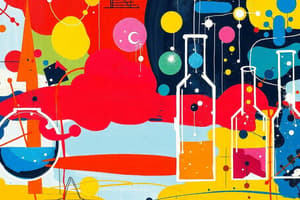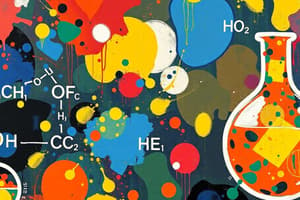Podcast
Questions and Answers
What defines a chemical reaction?
What defines a chemical reaction?
- A process that combines multiple substances
- A process that converts starting materials into new substances (correct)
- A process that occurs only in living organisms
- A method to balance chemical equations
What is a chemical equation?
What is a chemical equation?
It symbolizes the process of a chemical reaction.
What is a reactant?
What is a reactant?
Starting material of a reaction.
What is a product in a chemical reaction?
What is a product in a chemical reaction?
What is an intermediate in a chemical reaction?
What is an intermediate in a chemical reaction?
The Law of Conservation of Matter states that matter can be created or destroyed.
The Law of Conservation of Matter states that matter can be created or destroyed.
What are the basic rules of balancing equations?
What are the basic rules of balancing equations?
What are the categories for classifying chemical reaction types?
What are the categories for classifying chemical reaction types?
What is a combination reaction?
What is a combination reaction?
What characterizes corrosion reactions?
What characterizes corrosion reactions?
What occurs during decomposition reactions?
What occurs during decomposition reactions?
What is the driving force of a chemical reaction?
What is the driving force of a chemical reaction?
Which reaction follows the pattern AB + CD --> AC + BD?
Which reaction follows the pattern AB + CD --> AC + BD?
What do neutralization reactions produce?
What do neutralization reactions produce?
What defines an oxidation number?
What defines an oxidation number?
What does OILRIG stand for?
What does OILRIG stand for?
Flashcards
Chemical Reaction
Chemical Reaction
Transforms one or more starting materials into new substances.
Chemical Equation
Chemical Equation
Represents the chemical reaction using symbols.
Reactant/Reagent
Reactant/Reagent
The substance that undergoes change in a chemical reaction.
Product
Product
Signup and view all the flashcards
Law of Conservation of Matter
Law of Conservation of Matter
Signup and view all the flashcards
Balancing Equations
Balancing Equations
Signup and view all the flashcards
Combination Reaction
Combination Reaction
Signup and view all the flashcards
Decomposition Reaction
Decomposition Reaction
Signup and view all the flashcards
Single Displacement
Single Displacement
Signup and view all the flashcards
Double Displacement
Double Displacement
Signup and view all the flashcards
Redox Reactions
Redox Reactions
Signup and view all the flashcards
Bronsted-Lowry Acid
Bronsted-Lowry Acid
Signup and view all the flashcards
Lewis Acid
Lewis Acid
Signup and view all the flashcards
Precipitation Reactions
Precipitation Reactions
Signup and view all the flashcards
Oxidation Number
Oxidation Number
Signup and view all the flashcards
Driving Forces
Driving Forces
Signup and view all the flashcards
Study Notes
Chemical Reactions
- Chemical Reaction: Transforms one or more starting materials into new substances.
- Chemical Equation: Represents the chemical reaction using symbols.
- Reactant/Reagent: The substance that undergoes change in a chemical reaction.
- Product: New substance produced from a chemical reaction.
- Intermediate: Temporary substance formed during the conversion from reactants to products, often not shown in the equation.
Conservation and Balancing
- Law of Conservation of Matter: Mass is conserved; atoms in the reactants must equal atoms in the products.
- Balancing Equations: Essential steps include identifying reactants/products, balancing elements with fewer molecules first, and adjusting coefficients to eliminate fractions.
Classifying Reactions
- Two main classifications: based on compositions of reactants/products and reactions' driving forces.
Types of Reactions
- Combination Reactions: Two or more reactants combine to form one product (e.g., A + B → AB).
- Specific Types of Combination Reactions: Include combustion, formation, and corrosion.
Reaction Examples
- Combustion Reactions: Involves burning a substance in gas; releases energy (e.g., 3Mg + N2 → Mg3N2).
- Formation Reactions: Produce a single product from elements in standard states (e.g., 3C + 4H2 → C3H8).
Decomposition and Driving Forces
- Decomposition Reactions: A compound breaks down into two or more substances, often due to heat or light (e.g., AB → A + B).
- Driving Forces: Include increasing entropy, electron transfer for stability, and precipitation formation.
Displacement Reactions
- Single Displacement: An atom replaces another in a compound (e.g., A + BC → AB + C).
- Double Displacement: Two compounds exchange elements and form two new compounds (e.g., AB + CD → AC + BD).
Redox Reactions
- Redox: Electrons transfer occurs; involves oxidation (loss) and reduction (gain) of electrons.
- Oxidation Number: Indicates the charge of an atom in a molecule or ion; rules exist for assigning these numbers.
Acids and Bases
- Bronsted-Lowry Definition: Acids donate protons; bases accept protons.
- Lewis Definition: Acids are electron pair acceptors; bases are electron pair donors.
Precipitation Reactions
- Form solid products from reactants in a metathesis reaction (e.g., NaOH + AgNO3 → NaNO3 + AgOH).
Summary of Key Points
- Balancing is crucial for accurate chemical equations.
- Understanding the driving forces helps to predict the direction and feasibility of reactions.
- The role of oxidizing and reducing agents is critical in redox reactions.
Studying That Suits You
Use AI to generate personalized quizzes and flashcards to suit your learning preferences.




